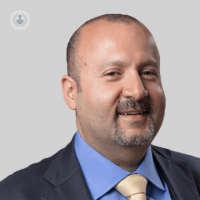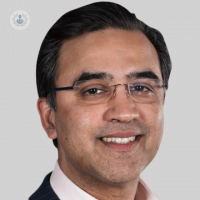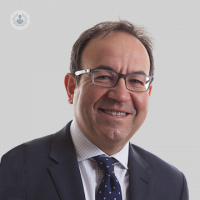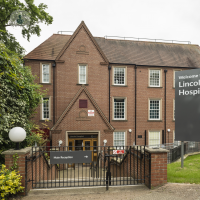What is knee surgery?
Knee surgery is a set of procedures aimed at treating knee joint pathologies. These can be due to sports injuries (e.g. fractures, sprains or ligament tears, or inflammation), malformations, or degenerative diseases (e.g. arthritis).

Why is it done?
Knee surgery is performed to treat degenerative or traumatic joint conditions. The pathologies most frequently treated with knee surgery are knee arthritis, which involves wear-and-tear of the cartilage and structures such as the meniscus, bone and synovial tissue, causing a limitation of movement capacity and joint deformation. Knee surgery aims to improve the performance of the joint, reduce pain and discomfort, and increase mobility.
What does knee surgery involve?
Knee surgery employs numerous techniques. For the treatment of degenerative diseases, the most commonly used techniques are:
- Arthroscopy: Minimally invasive knee surgery that inserts very small surgical instruments through small incisions.
- Osteotomy: Parts of the bone are cut to improve the alignment of the joint and improve its function.
- Implantation of prostheses: Indicated when the joint is severely damaged (i.e. knee replacement surgery).
How do you prepare for knee surgery?
Preparation for surgery may vary depending on the type of surgery to be performed. Generally, clinical history will be taken and examinations made (e.g. X-ray) to help decide which surgical procedure it most appropriate. It is also recommended to stop taking blood-thinning medications prior to surgery, but the specialist will provide any necessary information to the patient in order to best prepare for the operation.
Aftercare
The recovery times and the precautions to be followed vary according to the type of intervention carried out. Following hospital admission, the patient may experience pain that can be controlled by taking painkillers.
03-19-2013 08-25-2023Knee surgery
Professor Ali Ghoz - Orthopaedic surgery
Created on: 03-19-2013
Updated on: 08-25-2023
Edited by: Carlota Pano
What is knee surgery?
Knee surgery is a set of procedures aimed at treating knee joint pathologies. These can be due to sports injuries (e.g. fractures, sprains or ligament tears, or inflammation), malformations, or degenerative diseases (e.g. arthritis).

Why is it done?
Knee surgery is performed to treat degenerative or traumatic joint conditions. The pathologies most frequently treated with knee surgery are knee arthritis, which involves wear-and-tear of the cartilage and structures such as the meniscus, bone and synovial tissue, causing a limitation of movement capacity and joint deformation. Knee surgery aims to improve the performance of the joint, reduce pain and discomfort, and increase mobility.
What does knee surgery involve?
Knee surgery employs numerous techniques. For the treatment of degenerative diseases, the most commonly used techniques are:
- Arthroscopy: Minimally invasive knee surgery that inserts very small surgical instruments through small incisions.
- Osteotomy: Parts of the bone are cut to improve the alignment of the joint and improve its function.
- Implantation of prostheses: Indicated when the joint is severely damaged (i.e. knee replacement surgery).
How do you prepare for knee surgery?
Preparation for surgery may vary depending on the type of surgery to be performed. Generally, clinical history will be taken and examinations made (e.g. X-ray) to help decide which surgical procedure it most appropriate. It is also recommended to stop taking blood-thinning medications prior to surgery, but the specialist will provide any necessary information to the patient in order to best prepare for the operation.
Aftercare
The recovery times and the precautions to be followed vary according to the type of intervention carried out. Following hospital admission, the patient may experience pain that can be controlled by taking painkillers.
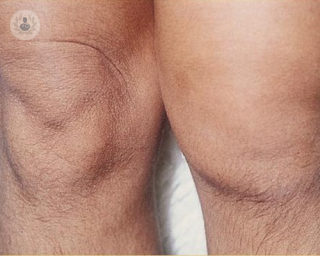

Why get a partial knee replacement?
By Mr Winston Kim
2025-01-20
As we get older, our knees might start to suffer due to arthritis and other conditions, and a knee replacement might look inevitable. However, there are alternatives to the total replacement procedure. Leading Manchester orthopaedic surgeon Mr Winston Kim is here to explain partial knee replacements and their advantages. See more


Knee osteotomy: can I choose it over replacement surgery?
By Mr David Elson
2025-01-20
Doing your research on treatment for knee arthritis? If you are not keen on having a knee joint replacement, you should ask your specialist about a knee osteotomy, or preservation surgery. Leading orthopaedic surgeon Mr David Elson explains more about both procedures and just who is suitable for osteotomy. See more


Unloader knee brace: taking the pressure off
By Professor Paul Lee
2025-01-20
The unloader knee brace is designed to reduce the pressure on one side of the knee and can be worn daily or only during sporting activities. Leading orthopaedic surgeon Professor Paul Lee explains all about the specialist brace. See more
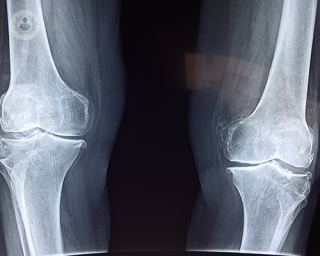

Painful knee clicking: causes and solutions explained
By Mr Graeme Nicholas Fernandez
2025-01-20
Why does your knee click? When should you see a doctor or specialist about painful clicking? Mr Graeme Nicholas Fernandez, one of the Uk's most experienced orthopaedic surgeons, answers these common questions and more to provide you with a solid understanding of painful knee clicking and the solutions available for each potential cause. He also clarifies how you can still receive help in the times of the COVID-19 pandemic. See more
Experts in Knee surgery
-
Professor Ali Ghoz
Orthopaedic surgeryExpert in:
- Hip replacement
- Knee replacement
- Knee surgery
- Platelet-rich plasma
- Knee arthroscopy
- Anterior cruciate ligament
-
Mr Minhal Chatoo
Orthopaedic surgeryExpert in:
- Osteotomy
- Knee surgery
- ACL reconstruction
- Knee arthroscopy
- Knee replacement
- Sports injuries
-
Mr Paul Trikha
Orthopaedic surgeryExpert in:
- Knee surgery
- ACL reconstruction
- Knee replacement
- Knee arthroscopy
- Sports injuries
- Meniscus
-
Professor Stefano Zanasi
Orthopaedic surgeryExpert in:
- Knee surgery
- Knee osteoarthritis
- Robotic surgery
- Stem cells
- Prolotherapy
- Arthroplasty
-
Mr Jordi Sanchez-Ballester
Orthopaedic surgeryExpert in:
- Ankle
- Foot
- Knee arthroscopy
- Arthroplasty
- Knee surgery
- Osteoarthritis
- See all

Lincoln Private Hospital - part of Circle Health Group
Lincoln Private Hospital - part of Circle Health Group
Nettleham Road, Lincoln, Lincolnshire, LN2 1QU
No existe teléfono en el centro.
By using the telephone number provided by TOP DOCTORS, you automatically agree to let us use your phone number for statistical and commercial purposes. For further information, read our Privacy Policy
Top Doctors

The Wellington Hospital - part of HCA Healthcare
The Wellington Hospital - part of HCA Healthcare
Wellington Hospital South Bldg, 8A Wellington Pl, NW8 9LE
No existe teléfono en el centro.
By using the telephone number provided by TOP DOCTORS, you automatically agree to let us use your phone number for statistical and commercial purposes. For further information, read our Privacy Policy
Top Doctors

Cleveland Clinic London Hospital
Cleveland Clinic London Hospital
33 Grosvenor Place, SW1X 7HY
No existe teléfono en el centro.
By using the telephone number provided by TOP DOCTORS, you automatically agree to let us use your phone number for statistical and commercial purposes. For further information, read our Privacy Policy
Top Doctors
-
Lincoln Private Hospital - part of Circle Health Group
Nettleham Road, Lincoln, Lincolnshire, LN2 1QU , LincolnExpert in:
- Abdominal ultrasound
- Abdominoplasty
- Radiofrequency ablation (RFA)
- Acne
- Vascular Surgery
- Thread veins
-
The Wellington Hospital - part of HCA Healthcare
Wellington Hospital South Bldg, 8A Wellington Pl, NW8 9LE, Central LondonExpert in:
- Digestive
- Cardiology
- Orthopaedic surgery
- Orthopaedic spinal surgery
- Intensive care
- Spine
-
Cleveland Clinic London Hospital
33 Grosvenor Place, SW1X 7HY, Central LondonExpert in:
- Cardiology
- Colorectal surgery
- Minimal access surgery (keyhole surgery)
- Gallbladder surgery
- Diagnostic Imaging
- Ultrasound
- See all
- Most viewed diseases, medical tests, and treatments
- Ulnar nerve entrapment
- Peripheral nerve block
- Peripheral neuropathy
- Joint pain
- Lumbar herniated disc
- Spinal surgery
- Minimal access surgery (keyhole surgery)
- Shoulder pain
- Osteoporosis
- Botulinum toxin (Botox™)
